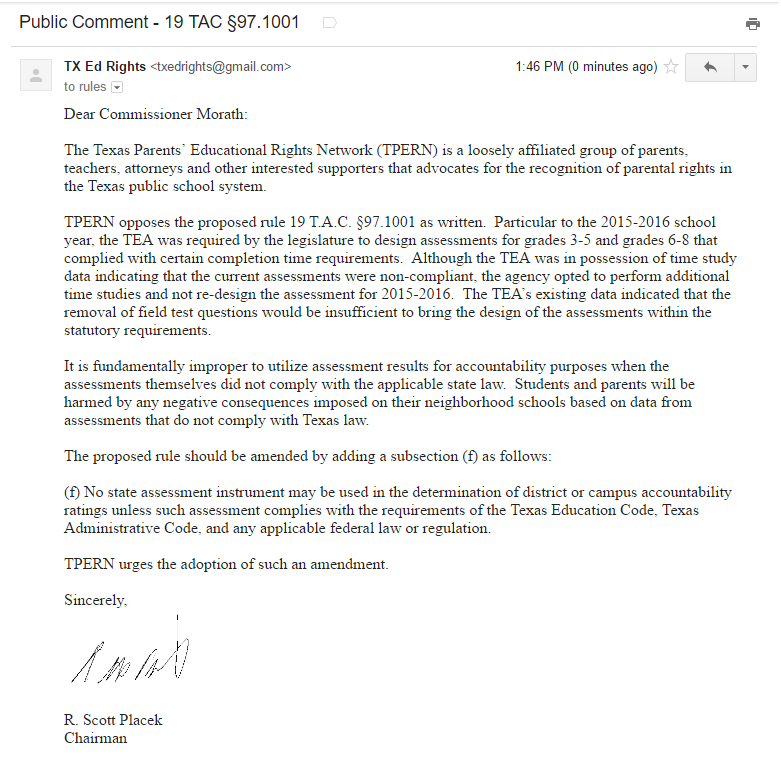It’s always something. For whatever reason, misinformation spreads faster in school districts than lice. And much like lice, the students are always the ones who get the raw end of the deal. Although we ought to be well past the point of arguing about this, apparently ESCs and school counselors are spreading blatantly incorrect information about the eligibility of students to graduate under an IGC. In the Texans Take Action Against STAAR Facebook group today, a counselor posted this completely erroneous statement regarding eligibility for IGC graduation:
“She will need to attempt the test and fail two times before the scores can be accepted or before she is eligible for an IGC .” (emphasis added).
(a) This section applies only to an 11th or 12th grade student who has failed to comply with the end-of-course assessment instrument performance requirements under Section 39.025 for not more than two courses.
(b) For each student to whom this section applies, the school district that the student attends shall establish an individual graduation committee at the end of or after the student’s 11th grade year to determine whether the student may qualify to graduate as provided by this section.
First, note that there is no language limiting the application of the section to students who have attempted and failed their EOCs twice. The limit is that they can be lacking no more than two assessments for graduation. Section (b) tells us that if this section applies to them, the school shall establish an IGC committee to determine whether the student qualifies to graduate. This is mandatory – not permissive – language. The statute then lays out the factors that the committee must consider in “determining whether a student for whom an individual graduation committee is established is qualified to graduate.” Not included in the 15 factors set by statute is any requirement of additional attempts to pass the EOC.
While this should settle the question, let’s look at what the Commissioner’s Rules enacting this section say. The commissioner may impose necessary rules to implement the statute. ESCs, districts and schools cannot add additional requirements.
§74.1025. Individual Graduation Committee Review.
(a) Effective beginning with the 2014-2015 school year, in accordance with the Texas Education Code (TEC), §28.0258, §101.3022 of this title (relating to Assessment Requirements for Graduation), and the course requirements in Chapter 74, Subchapter B, of this title (relating to Graduation Requirements), a school district or an open-enrollment charter school may award a high school diploma to a student who has taken but failed to achieve the end-of-course (EOC) assessment graduation requirements for no more than two courses if the student has qualified to graduate by means of an individual graduation committee.
Arguably, the Commissioner has added to the statute with the requirement that the student have taken the EOC assessment. But even having done that, neither here nor any any other part of the rule, has the commissioner inserted a double attempt/double failure requirement. So why are schools spreading (and I assume implementing) this obviously incorrect interpretation of the law. Enter the ESCs.
Texas has a number of Educational Service Centers dispersed across the state to support local districts in their area. These ESCs give presentations, formulate guides, and generally provide administrative assistance to districts. But they aren’t lawyers and they aren’t exceptionally overstaffed. So when one ESC puts something new out, other ESCs pick it up and run with it. And that is what has happened with the IGC process. Even though the current FAQ on the TEA website contains no reference whatsoever to a double attempt/double failure rule, some ESCs started propogating this as fact. Offenders include Denise Bell/ESC 12, ESC 10 which is circulating an incorrect flow chart from Garland ISD. Educational consultants Moak Casey analyzed the bill and came up with no such double failure requirement.
It is not clear where this idea originated, though there are two possibilities. The first possibility is confusion over the TSI substitution requirements. When SB 149 was passed, the legislature also provided that if a student has passed Texas’s college readiness assessment for Math or English (the TSI test) they may substitute that passage for failure on Math or English as applicable. However, the legislature did put a restriction on this ability to substitute. The TSI substitution provision states:
A student who, after retaking an end-of-course assessment instrument for Algebra I or English II, has failed to perform satisfactorily as required by Subsection (a), but who receives a score of proficient on the Texas Success Initiative (TSI) diagnostic assessment for the corresponding subject for which the student failed to perform satisfactorily on the end-of-course assessment instrument satisfies the requirement concerning the Algebra I or English II end-of-course assessment, as applicable.
This is what a retake/double failure requirement looks like. But this language is not in the IGC provision. It is found only as a pre-requisite for substituting TSI scores for EOC assessments in meeting graduation requirements. Since the legislature in the same bill knew how to add such a requirement, it is patently unreasonable to assume they meant to add it to a section which it is noticeably absent from. Still, it is possible that some administrators may have assumed that the same requirements for substituting TSI scores applied to eligibility for IGCs. But they are different statutes and such an assumption is simply wrong.
The other possibility for confusion lies in a very simple provision that means nothing more than what it says. Toward the end of the IGC statute, the law states:
Notwithstanding any action taken by an individual graduation committee under this section, a school district shall administer an end-of-course assessment instrument to any student who fails to perform satisfactorily on an end-of-course assessment instrument as provided by Section 39.025(b).
Now this section is not a double failure requirement. All this does is provide that even if an IGC approves graduation for a student, the school must continue to give them the assessments they have failed. We know it is not an eligibility provision because it begins by presuming that an IGC already has been formed and taken action. If that happens before any re-test, there can’t be a re-test requirement. No. This just tells a school to keep offering the assessment no matter what the IGC does. It notably does not require the student to be present, to take it, or to perform at any given level. Likewise it does not provide any authority to revisit the IGC decision if the student refuses or is absent from the administration of the EOC. Again, this is very obvious to any lawyer who reads the statute. This can’t be a pre-requisite to eligibility because it presumes that the student is eligible and some action has been taken. However, to a non-lawyer trying to decipher this statute, it is possible it could be confused with a re-test requirement. But it isn’t one.
Truly the most maddening issue with the two test/two failure interpretation is that it does not come from the TEA. Nothing on the TEA website even hints at it. Not that this trumps the actual language of the law, but if there was something as basic as a two attempt/two failure requirement, you would expect to see that front and center in those types of words in the TEA guidance. The absence of such language speaks as loudly as the statute itself. Rather, some administrator somewhere thought they would make this up, and everyone else followed along . . . all to the detriment of the student. Hopefully no students will actually be harmed by this. However, if you run into schools communicating such a construction, please report them to us and if your student is affect, obtain legal counsel promptly.





